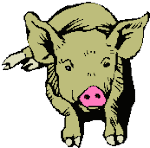August 8 marks the fifteenth anniversary of the discovery
of Classical Swine Fever in 2000 on a farm near here, with Foot and Mouth following in the February. Britain was also awaiting the results of an enquiry into the
origins of Mad Cow (BSE) at that time.
Appalled at what was going on around us, the
writer started campaigning almost immediately. First with “Pigging It”, then
devoting the existing Self-Sufficiency in Style website to the issue, followed
by regular posts to newsgroup uk.business.agriculture and finally also a
blog: Animal-Epidemics.
The writer is tired and needs a break, having worked almost
every day since, including Christmas Day, except when actually in hospital. Posting was often done when on the move - from the USA, Germany, France, Holland, Cyprus, all over the British
Isles and even from sea.
The decision to cease campaigning was made a few days ago, following the realisation that the writer was no longer a lonely voice in the wilderness.
Now, the WWW is full of animal health, related human and
zoonotic issues. The consequences of veterinary drug dealing creating a worldwide antibiotic resistant disaster are widely understood.
Hundreds of campaign groups, formal and informal, are investigating the catastrophe and posting far and wide.
News, new science, complaints, criticism and comments are pouring out in every language. The veterinarians can no longer work unchallenged.
News, new science, complaints, criticism and comments are pouring out in every language. The veterinarians can no longer work unchallenged.
In recent weeks, there have been some amazing changes in
attitude from high in Britain's corrupt veterinary establishment, its many wealthy charities and front organisations.
Maybe it is conscience, maybe fear. They must realise that the analysis of DNA in stored samples will expose the crimes against humanity and the vicious cover-ups.
We can’t put the genie of superbugs back in the
bottle, but disaster and reform are bedfellows, and it is right and proper to
stand back and allow the forces of institutional reform in Britain space to operate.
It only remains for me to thank so many for the kindness
and support over so many years.
And wish the reformers every success.
There will be time to get on with writing that abandoned book and maybe even finish it this time.
--
Regards
Pat Gardiner
Release and independently audit the results of testing
British pigs
for MRSA, C.Diff and Hepatitis E now!
